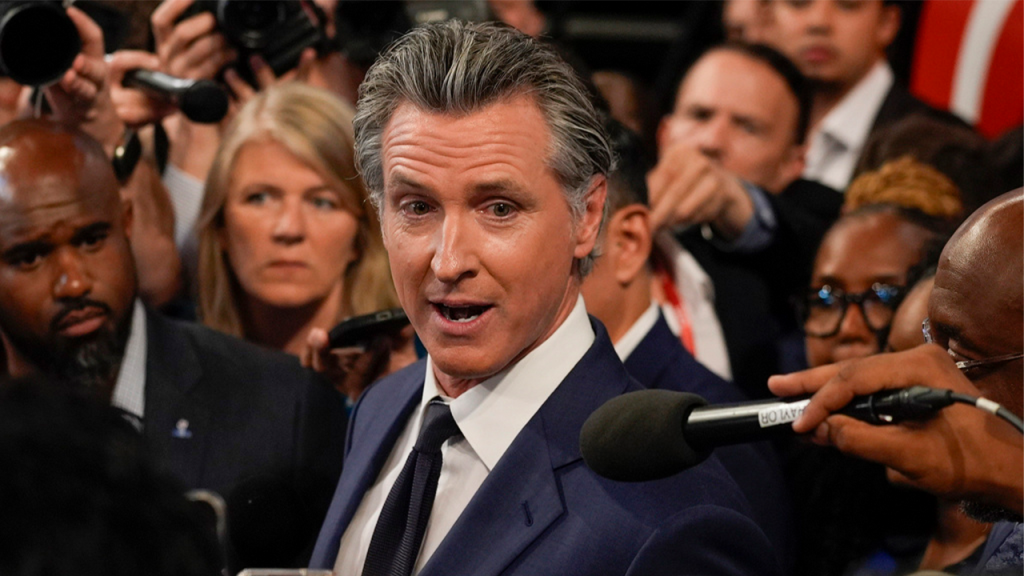Newsom’s Stand Against Trump: A California Clash of Values
In a bold departure from tradition, California Governor Gavin Newsom chose to deliver his State of the State address through a letter to the state legislature rather than a formal speech – the third consecutive year he’s broken with decades of precedent. On California’s 175th anniversary of statehood, Newsom’s message didn’t mince words about what he perceives as an existential battle with the Trump administration. “We are now nine months into a battle to protect the values we hold most dear,” Newsom declared, characterizing the federal administration as “built on incompetence and malicious ignorance, one that seeks the death of independent thinking.” His frank assessment reveals the deepening divide between America’s most populous state and the federal government, setting the stage for what promises to be an intensifying conflict of visions for America’s future.
The relationship between California and the Trump administration has deteriorated across multiple policy fronts, creating a patchwork of legal and political confrontations. Immigration stands at the forefront of these battles, with federal raids targeting migrant workers sparking protests that prompted the deployment of National Guard and Marine forces to the Los Angeles area. The conflict extends beyond immigration, however, with the federal government cutting funding for California’s high-speed rail project, rolling back the state’s prohibition on new gas-powered vehicles, and suing over a law allowing transgender girls to compete on sports teams matching their gender identity. The governor specifically highlighted Trump’s move to suspend funding to UCLA over allegations of antisemitism as another point of contention. California hasn’t simply played defense – the state has filed 41 lawsuits against the administration and allocated $50 million to its Department of Justice to preserve its progressive policies.
Despite these challenges, Newsom struck a defiant tone, asserting that “It would be a mistake to think California is cowering in the face of this onslaught.” Throughout his address, the governor highlighted what he considers state achievements, including the rapid recovery efforts following Los Angeles wildfires, advancements in technology and green energy, educational improvements, and programs to boost volunteerism among young Californians. He also touted tax credits designed to bring Hollywood productions back to the state. Newsom’s message conveyed a clear narrative: California isn’t just defending itself against federal policies it considers harmful but is actively building an alternative vision for America’s future – one founded on progressive values, environmental leadership, and technological innovation.
The governor’s approach hasn’t escaped criticism, particularly from Republican state lawmakers who contend that Newsom is more focused on building his national profile than addressing pressing issues within California. State Assembly GOP leader James Gallagher pointedly urged Newsom to “Stop refusing to show up and actually do the work of being a governor,” highlighting ongoing budget deficits, a persistent homelessness crisis, and the state’s notoriously high cost of living. These criticisms speak to the complex reality that underlies California’s progressive reputation – despite its economic might and progressive achievements, the state continues to grapple with significant challenges that affect millions of residents’ daily lives. Gallagher also criticized Newsom’s support for a U.S. House redistricting plan designed to boost Democrats’ chances of winning control of the chamber in the 2026 midterms, characterizing it as a partisan maneuver rather than substantive governance.
Newsom’s confrontational stance toward the Trump administration reflects California’s unique position in American politics. As the most populous state with the world’s fifth-largest economy, California wields significant influence over national policy through both its economic power and its 54 electoral votes. The ongoing legal battles between the state and federal government represent more than routine political disagreement – they reflect fundamentally different visions for America’s future. Newsom’s characterization of Trump’s “relentless, unhinged California obsession” suggests he sees the administration’s actions as targeted specifically at undermining California’s progressive model. This framing positions the state as both a target of federal hostility and a bulwark defending progressive values against conservative policies.
The tensions between California and the Trump administration highlight the intensifying polarization in American politics, where states increasingly function as laboratories for competing ideological visions. Newsom’s approach to governance, emphasizing California’s role as a progressive counterweight to federal policies, positions him as a national figure in Democratic politics – feeding speculation about his presidential ambitions for 2028. His willingness to engage in direct confrontation with the Trump administration stands in contrast to more moderate Democratic governors, reflecting California’s solid blue status and Newsom’s confidence in his political standing. As the 2024 election approaches, the relationship between California and the federal government will likely remain contentious, with Newsom continuing to position the state as a defender of progressive values against what he perceives as an existential threat. Whether this approach effectively addresses California’s internal challenges while advancing its national influence remains to be seen, but Newsom has made clear he intends to fight on both fronts simultaneously.














